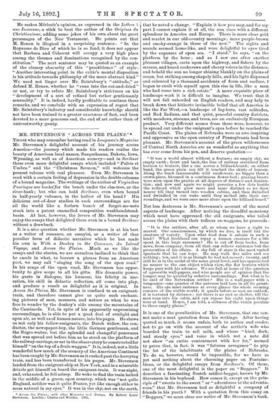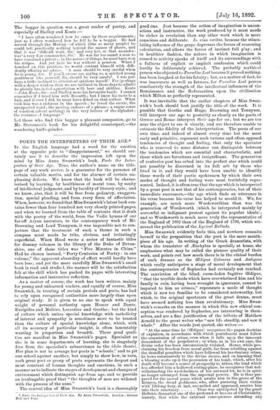MR. STEVENSON'S " ACROSS THE PLAINS."* THOSE who may remember
having read in Longman's Magazine Mr. Stevenson's delightful account of his journey across America—the journey which made his readers realise the beauty of American local names, Susquehanna, Dakota, Iowa, Wyoming, as well as of American scenery—and in Scribner those even more delightful essays which included " Pulvis et -Umbra " and the " Christmas Sermon," will welcome the present volume with real pleasure. Even Mr. Stevenson is read with a certain feeling of depression in the double columns of a bound magazine. The writings of the author of Virginibus Puerisque are books:for the bench under the elm-tree, or the river-bank ; but who can hold Scribner, even when bound in half-yearly volumes, in the hollow of his hand ? His delicious out-of-door studies in such surroundings are for all the world like a forlorn bunch of forget-me-nots stuck into a patent enamelled composition washhandstand- basin. At last, however, the lovers of Mr. Stevenson may enjoy the essays that delighted them even in a bound Scribner without a drawback.
It is a nice question whether Mr. Stevenson is at his best as a writer of romance, an essayist, or a writer of that peculiar form of didactic narrative which he has made his own in With a Donkey in the Cevennes, An Inland Voyage, and Across the Plains. Much as we like the essays and the stories, we are ourselves inclined to think that he excels in what, to borrow a phrase from an American poet, we may call " singing the song of the open road." In his songs of the open road, Mr. Stevenson has oppor- tunity to give scope to all his gifts. His dramatic power, his gusto in dialogue, his humour, his felicity in nar- ration, his skill in didactic reflection, all come into play, and produce a result as delightful as it is original. In Across the Plains, Mr. Stevenson is confined to an emigrant- train, and therefore cannot give us quite such enchant- ing pictures of men, manners, and nature as when he was free to wander by the donkey's side among the mountains of the Camisards. Yet, in spite of his apparently unpromising surroundings, he is able to put a good deal of sunlight and open air, as well as of human nature, into his pages. He shows us not only his fellow-emigrants, the Dutch widow, the con- ductor, the newspaper-boy, the little German gentleman, and the Negro waiter, but the splendid and changeful panorama that was spread out before him as he stood on the platform of the railway-carriage, or sat in the observatory he constructed for himself "on the top of a fruit-waggon." It is, indeed, not a little wonderful how much of the scenery of the American Continent has been caught by Mr. Stevenson as it rushed past the hurryin g train, and has been transferred to his pages. Mr. Stevenson landed from the emigrant-ship at New York, and in a miserable drizzle got himself on board the emigrant-train. It was night, and, exhausted, be fell asleep. He woke to find the train halted in the middle of a green, open country, which was "not quite England, neither was it quite France, yet like enough either to seem natural in my eyes." It was in the sky, not on the earth,
• Across the Plains; with other Memories and Essays. By Robert Louis Etevenson. London : Chatto and Windns. 1992.
that he noted a change. "Explain it how you may, and for my part I cannot explain it at all, the sun rises with a different splendour in America and Europe. There is more clear gold and scarlet in our old-country mornings ; more purple-brown
and smoky-orange in those of the new." The sights and
sounds seemed home-like, and were delightful to eyes tired by the expanses of open sea. "I stood," he says, "on the platform by the hour ; and as I saw one after another pleasant villages, carts upon the highway, and fishers by the stream, and heard cockcrows and cheery voices in the distance, and beheld the sun no longer shining blankly on the plains of ocean, but striking among shapely hills, and his light dispersed and coloured by a thousand accidents of form and surface, I began to exult with myself upon this rise in life, like a man who had come into a rich estate." A more exquisite piece of landscape work it is difficult to imagine. We trust that it will not fall unheeded on English readers, and may help to break down that hitherto invincible belief that all America is like the Far West,—a landscape of log-huts, vast solitudes,
and Red Indians, and that quiet, peaceful country districts, with meadows, streams, and trees, are an exclusively European product. Very different scenes from these were, however, to be spread out under the emigrant's eyes before he reached the
Pacific Coast. The plains of Nebraska were as awe-inspiring and oppressive as the open country of Pennsylvania had been
pleasant. Mr. Stevenson's account of the green wildernesses of Central North America, are as wonderful as anything that
has ever come from his pen, and deserve quotation :—
" It was a world almost without a feature ; an empty sky, an empty earth ; front and back, the line of railway stretched from horizon to horizon, like a cue across a billiard-board ; on either hand, the green plain ran till it touched the skirts of heaven. Along the track innumerable wild sunflowers, no bigger than a crown-piece, bloomed in a continuous flower-bed ; grazing beasts were seen upon the prairie at all degrees of distance and diminu- tion; and now and again we might perceive a few dots beside the railroad which grew more and more distinct as we drew nearer till they turned into wooden cabins, and then dwindled and dwindled in our wake until they melted into their sur- roundings, and we were once more alone upon the billiard-board."
Not less dexterous is Mr. Stevenson's account of the moral aspects of landscape. After noticing the dreadful monotony which must have oppressed the old emigrants, who toiled across the plains with their tedious ox-waggons, he proceeds : " It is the settlers, after all, at whom we have a right to marvel. Our consciousness, by which we live, is itself but the creature of variety. Upon what food does it subsist in such a land ? What livelihood can repay a human creature for a life spent in this huge sameness ? He is cut off from books, from news, from company, from all that can relieve existence but the prosecution of his affairs. A sky full of stars is the most varied spectacle that he can hope. He may walk five miles and see nothing ; ten, and it is as though he had not moved ; twenty, and still he is in the midst of the same great level, and has approached no nearer to the one object within view, the flat horizon which keeps pace with his advance. We are full at home of the question of agreeable wall-papers, and wise people are of opinion that the temper may be quieted by sedative surroundings. But what is to be said of the Nebraskan settler ? His is a wall-paper with a vengeance—one quarter of the universe laid bare in all its gaunt- ness. His eye must embrace at every glance the whole seeming concave of the visible world; it quails before so vast an outlook, it is tortured by distance ; yet there is no rest or shelter, till the man runs into his cabin, and can repose his sight upon things near at hand. Hence, I am told, a sickness of the vision peculiar to these empty plains."
It is one of the peculiarities of Mr. Stevenson, that one can- not make a neat quotation from his writings. After having quoted so much, it seems unfair, both to author and reader, not to go on with the account of the settler's wife who boarded the train to sell milk, and whose " kind, dark, and steady eyes," and voice in which not a note did not show "an entire contentment with her lot," seemed to prove that, in fact, it was "fatuous arrogance" to pity the lot of the inhabitants of the plains of Nebraska.
To do so, however, would be impossible, for we have as yet said nothing about the charming paper on Fontaine- bleau, or the delightful essays from Scribner's. Of these, one of the most delightful is the paper on "Beggars." It describes a fascinating Scotch soldier-beggar, known by Mr. Stevenson in his boyhood. How comes it, except on the prin- ciple of "sweets to the sweet" or " adventures to the adventu- rous," that Mr. Stevenson had so delightful a company of friends in his youth ? With a quotation from this essay on "Beggars," we mast close our notice of Mr. Stevenson's book. The beggar in question was a great reader of poetry, and especially of Shelley and Keats :-
" I have often wondered how he came by these acquirements ; just as I often wondered how he fell to be a beggar. He had served through the Mutiny—of which (like so many people) he could tell practically nothing beyond the names of places, and that it was difficult work, Sir,' and very hot, or that so-and-so was a very fi as commander, Sir.' He was far too smart a man to have remained a private ; in the nature of things, he must have won his stripes. And yet here he was without a pension. When I touched on this problem, he would content himself with diffi- dently offering me advice. A man should be very careful when he is young. Sir. If you'll excuse me saying so, a spirited young gentleman like yourself, Sir, should be very careful. I was per- haps a trifle inclined to atheistical opinions myself.' For (perhaps with a deeper wisdom than we are inclined in these days to admit) he plainly bracketed agnosticism with beer and skittles. Keats —John Keats, Sir—and Shelley were his favourite bards. I cannot remember if I tried him with Rossetti ; but I know his taste to a hair, and if ever I did, he must have doted on that author. What took him was a richness in the speech ; he loved the exotic, the unexpected word ; the moving cadence of a phrase ; a vague sense of emotion (about nothing) in the very letters of the alphabet : the romance of language."
Let those who find this beggar a pleasant companion, go to Mr. Stevenson's book for his delightful counterpart,—the
wandering knife-grinder.



































 Previous page
Previous page